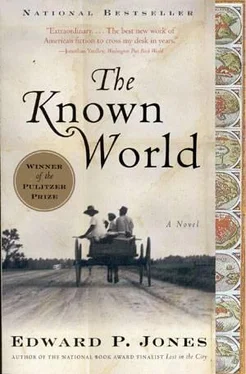After he had given the bucket to Delores and Patrick, Stamford stood in the lane in the mud and the rain and counted the doors to the cabins where children lived. He left out the ones with infants because he knew they weren’t old enough to bite down and enjoy blueberries. And he had never heard of a sugar tit laced with blueberries. He kept counting wrong and he had to do it over several times. Once that was done, he knew he had a new problem-how to find enough buckets for all those damn blueberries.
The rain stopped the next day, but it came back three days later. It was far worse and anyone walking in it felt the sting. “It was a very painful rain,” K. Woodford, a historian from Lynchburg College, wrote in 1952. The rain led to great flooding, and the Lynchburg historian noted, without hyperbole, that it may well have been the worst any county had suffered since Virginia became a state. Twenty-one human beings lost their lives, including eight adult slaves, five men and three women. All the children, whether white or black or Indian, free or in bondage, were spared. No one counted the livestock and the dogs and the cats that were killed because there were so many. The land was covered with animal bodies for weeks and weeks.
Three weeks to the day after Clement beat Stamford, the man from Atlas Life, Casualty and Assurance came back for the third time in his rented buggy and was told by Caldonia that she wanted no insurance. Maude was looking over her shoulder, sighing with displeasure.
”Good morning, Mrs. Townsend,” the white man said to Caldonia before she sent him away, the big book in one hand and his hat in the other hand. It was his first chance to speak to her directly. “We are pained at your unfortunate loss. My company, Atlas Life, Casualty and Assurance, and all its employees send their everlasting condolences.”
Caring for Stamford after he was beaten convinced Caldonia to try to put her grief aside as much as she could and get to the business of the plantation. She decided, after hearing from Celeste and Gloria and Clement, that Clement would not be punished. She sent word by Moses to Stamford that he was to mind what he was doing from now on. “No more fighting, from anyone,” she told Moses, though it was many days before Stamford obeyed, after the crows, after the blueberries and the cabin.
Moses did, on his own, require that Stamford and Clement work a few hours on three Sundays. They could have appealed to Caldonia, but they thought everything he did came on orders from her. The first Sunday was one not long after Stamford had gone back to the fields after the beating, and Elias worked for him after Celeste said she did not think Stamford could do seven days in a row.
In the wake of the beating, Caldonia now had Moses come and report to her each evening after all work was done. He stood in the parlor and told her all that had happened during the day, from the moment just after breakfast when he met the slaves in the lane until the moment in the evening when he told them their day was done. At first, the report was over and done with in a matter of minutes. But as the days since Henry’s death piled up, he would talk longer and longer, for he had come to sense that Caldonia wanted his words. Maude, and sometimes Fern, would peel away before he was done, but Caldonia and Calvin listened to every word. And when Caldonia was finally alone in the house and her mother and brother and Fern had gone away, she continued to listen and his report became even longer, sometimes as much as an hour. Soon, he began to leave off from talking about the work of the day and create stories out of nothing about the slaves. Loretta sat in a chair in a corner, knowing what was true and what was not but never telling her mistress.
The evening of the day Fern left, Caldonia told Moses to sit down. He looked over at Loretta in her chair, and after a long minute’s hesitation, he sat down. Caldonia told Loretta that she could retire for the evening and Loretta left.
“You were here from the beginning, weren’t you?” Caldonia said.
“Ma’am?”
“You were here with Henry in the beginning, from that first day?”
“Yessum, I was.”
“What did you do?”
Moses took his eyes from his lap and began to invent some early days when they were building the house and there was not much on the land except what God had put there. Caldonia was at the edge of the settee, in her mourning dress. “Now Masta Henry always knowed what kinda house he wanted to build, Mistress. I don’t even think he even knowed about you at that particular time, but he musta had some idea that you was out there somewhere waitin in your own kinda way, cause he set about buildin a house that you would want. He built it up from nothin. I was there but I wasn’t there like he was there. He said to me that first day, he said, ‘Moses, we gon start with the kitchen. A wife needs a place to fix her meals for her family. Thas where we gon start.’ And he bent down and Masta drove in that first nail. Bam! That was a Monday, Mistress, cause Masta Henry didn’t believe in startin somethin on a Sunday, God’s day.”
Caldonia, her hands clasped in her lap, leaned back and closed her eyes. The story about the first nail came a little more than a month after Henry had been in his grave. It was gospel among slaves that one of the quickest ways to hell was to tell lies about dead people, but Moses did not think about that as he spoke of the first nail, did not think about the dead needing the truth to be told about them. He did not think about it until that day Oden Peoples, the Cherokee patroller, said to the men around him about Moses, “Heft him on up here. I’ll take him in. He ain’t gon bleed for long.”
Barnum Kinsey, the patroller and the poorest white man in Manchester County, was quite sober when he met up with Harvey Travis and Travis’s brother-in-law, Oden Peoples, one night in early September a little more than five weeks after Henry Townsend died. Barnum had been sober for three and a half weeks, and he knew from experience that if he could survive the fourth-maybe even the fifth-week without drinking, he could move through the rest of the year without the craving that had often seized him in those first weeks, the craving that was gnawing at him even as he rode to meet up with Travis and Oden under the brightest moon he had seen in some time. After that fifth week of being sober, he would be able to look the craving full in the eye and say no and tell it to get on away from him. Then, with renewed strength, he could harvest whatever his land would give him that fall and for the rest of the year he could hire himself out so he and his family could make it with a little comfort through the winter.
He was desperately afraid of being without in the winter, saw the winter ahead as God’s challenge for him to pick himself up from drink and walk on two legs without tottering. His grandfather, who had also been a drinker, had died in the winter, gone out for a drink and froze to death on the fourth-coldest night of that winter. Barnum’s father had not been a drinker, so Barnum had been thinking for a long time that the curse tended to skip generations, for not one of his sons from his first marriage showed a need for the stuff. The boys from the second marriage had yet to smell themselves so drink wasn’t yet a problem. As for the women through the generations in his family, the curse had avoided all of them, and they moved through the world unsoiled, their minds clear without a need for a challenge every winter God sent.
The three of them, Barnum, Travis and Oden, were nearing ten o’clock when Augustus Townsend came up the road on his wagon pulled by a mule who was as tired as his owner. The mule was older than the other one Augustus had and he didn’t work him as much as the younger one, but every now and then he would take him out to show the mule that he still had faith in him. The mule and his man had delivered a chest and a chair and a walking stick to a man two counties away, a white man who had recently married off the last of his three daughters and so had a little money to spend on himself. “Make me happy with somethin,” he had told Augustus, “before that next grandchild pops into my world.” Augustus, as usual, had underestimated the time for the trip there and back and so he and the mule were about a day late getting home to his wife Mildred. Augustus had been thinking of Henry all day and all day he had been trying not to.
Читать дальше












